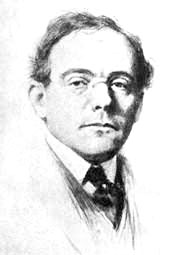Издателство |
| :. Издателство
LiterNet |
Медии |
| :. Електронно списание LiterNet |
| :. Електронно списание БЕЛ |
| :. Културни
новини |
Каталози |
| :. По
дати : Март |
| :. Електронни книги |
| :. Раздели / Рубрики |
| :. Автори |
| :. Критика за авторите |
Книжарници |
| :. Книжен
пазар |
| :. Книгосвят: сравни цени |
Ресурси |
| :. Каталог за култура |
| :. Артзона |
| :. Писмена реч |
За
нас |
| :. Всичко за LiterNet |
EDGAR LEE MASTERS
(1868-1950)
 Edgar
Lee Masters, poet and lawyer, was born in Garnett, Kansas, the son of Hardin
Wallace Masters, lawyer, and Emma J. Dexter, daughter of a New England minister.
Edgar
Lee Masters, poet and lawyer, was born in Garnett, Kansas, the son of Hardin
Wallace Masters, lawyer, and Emma J. Dexter, daughter of a New England minister.
Though his father had moved the family briefly to Kansas to set up a law practice, Masters grew up in the Western Illinois farmlands where his grandparents had settled in the 1820's. He was educated in the public schools in Petersburg and Lewistown (where he worked as a newspaper printer after school) and, after having read law with his father, started on a career as a lawyer and soon went into law practice on his own.
In 1914 Masters began a series of poems about his boyhood experiences in Western Illinois published (still under his pseudonym) in "Reedy's Mirror", St. Louis. This was the beginning of the book that would make his reputation: "Spoon River Anthology" (1915) -- one of the most popular and widely known works in all of American literature. In "The Genesis of Spoon River" (1933), he recalls how his interests turned to "combinations of my imagination drawn from the lives of the faithful and tender-hearted souls whom I had known in my youth about Concord, and wherever on Spoon River they existed." These graveyard epitaphs of the Spoon River people established his literary reputation worldwide. Though he would never equal the achievement or repute of "Spoon River Anthology", he continued publishing poetry, novels, essays, and biographies for nearly thirty years. The amount and wide range of his production far exceeded its quality, by most accounts, and Masters' place in twentieth-century American literature is still debated.
In the twenties and thirties Masters also tried his hand at fiction and biography. The novels are mostly about growing up in Illinois ("Mitch Miller", 1920; "Skeeters Kirby", 1923, and "Kit O'Brien", 1927) and have enjoyed little repute. The biographies are alternately adulatory as "Vachel Lindsay" (1935) and "Whitman" (1937), or controversial as in "Lincoln: The Man" (1931) and "Mark Twain: A Portrait" (1938). He saw biography as a form of revisionist history and set out to correct prevailing misconceptions about America's heroes and values.
For much of his life Masters was a political and social outsider. He often expressed contempt for smallmindedness - a theme carried through in his own later populism as well as literary values that developed against mainstream opinion. He described himself as committed to "the Democratic creed of 1896 and 1900" with "Americanism and Democracy as against European domination and Toryism."
In the years of the greatest notoriety for "Spoon River", Masters' personal life was less fortunate. While trying to balance two careers as lawyer and writer, he suffered a lingering and near-fatal bout of pneumonia. In 1923 he experienced a bitter divorce and moved to New York where he practiced law for some years. After a literary tour of the country in 1925, he published "Selected Poems" (1925), a collection that drew deserved attention to the variety of his poems. In 1926 he married Ellen Coyne. They lived in New York. Masters retired to the Chelsea Hotel to write a series of biographies as well as his own autobiography covering his boyhood years and his career up to 1917. "Across Spoon River" (1936) is blunt and cranky about a life he saw as largely "scrappy and unmanageable": emphasizing life on his grandfather's farm, his school days, his political battles, the inconveniences, the workday world, and the growth of a poet's mind through wide reading, the book is a valuable record of Masters' work habits and offers considerable insight on his positions as a critic and his place in American literature.
Over the next seven years, Masters was interviewed frequently and he was ready with valuable insights on American life and letters. Retired and not in the best health, Masters moved with his wife to her teaching positions in North Carolina and Pennsylvania. Throughout the forties he also received several literary awards (including the Poetry Society of America medal, Shelley Memorial Award, and the Academy of American Poets Fellowship). He died in Melrose, Pennsylvania in 1950 and is buried in Oakland Cemetery in Petersburg, Illinois.
Masters was comfortable with nineteenth-century long narrative poems and contributed much to the development of the modern idiom. For over four decades he celebrated the prairie landscapes, the people of Illinois, the values of his Midwestern heritage. As a biographer, he took the historical figures out of "the dust bins" and tried to "correct" the country's "vast mendacity" with a "sane record of men and affairs." As a poet he followed, as he himself put it, either the "cyclopean eye" of realism or the "dreaming eye" of mysticism. The poems and essays of this lawyer who hid poetry behind law books (he said the law and poetry were like "oil and water") may yet gain new attention from readers and critics.
=============================
© E-publisher LiterNet, 06.06.2009
The Sun Is but a Morning Star. Anthology of American Literature. Edited by Albena
Bakratcheva. Varna: LiterNet, 2008-2010
